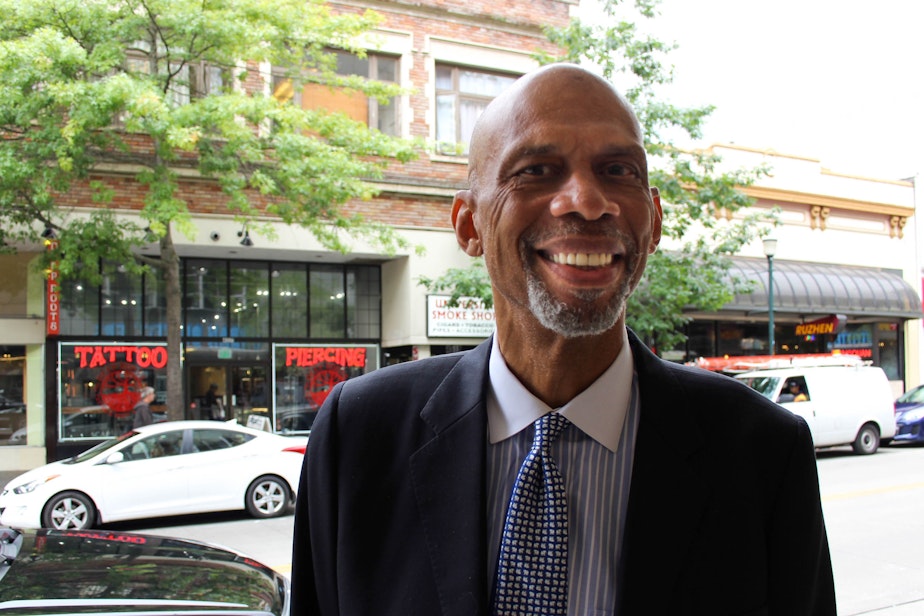Kareem Abdul-Jabbar to Seahawks: Do more than sit out the national anthem

UPDATE: Seahawks' wide receiver Doug Baldwin says the Seahawks will interlock arms at Sunday's game against the Miami Dolphins, which falls on the 15th anniversary of 9/11.
Kareem Abdul-Jabbar, the former NBA superstar and now cultural icon, made a public statement about inequality in 1968 when he boycotted the Olympics.
But decades later, Abdul-Jabbar doesn’t believe that NFL player Colin Kaepernick should refuse to stand for the national anthem.
“Not standing for the national anthem or wearing pig socks isn’t necessarily how he should approach that in my opinion,” Abdul-Jabbar said, speaking with KUOW’s Bill Radke.
“People are being shot and killed for no good reason other than they have dark skin and that's a real issue,” he said. But, he continued, “I think he can find a better way to protest it, and to try to help find the remedy.”
Sponsored
Seattle Seahawks players have discussed a "pregame demonstration of unity" before Sunday’s game at CenturyLink Field against the Miami Dolphins.
Abdul-Jabbar said he would meet with Seahawks players while he's in Seattle.
“I would tell them just to be careful,” he said. “You don't want to alienate the people that you're trying to win over. To do that, you have to understand their concerns and approach them in a way that shows respect. But they have to respect the fact that they're trying to achieve something that needs to be done.”
Sponsored
Not that Kaepernick or Seahawk players shouldn’t take a stand, Abdul-Jabbar said.
“The one it gets to me the most is the kid in Cleveland and he's just standing in the park – Tamir Rice. He's just standing in a park; cop just literally jumps out of his car and shoots him dead. He was standing there.”
Athletes could bridge the tense gap between cops and various communities.
“I hope that they take advantage of it because they're very popular. The Seahawks are so popular up here. They won a Super Bowl and everything. I'm sure that people will listen to them.”
Abdul-Jabbar said he would listen to the players and help them think about how to negotiate their position.
Sponsored
“Every tense situation can be a win-win if people have some sense and some respect for each other,” he said. He said fans might not understand why players aren’t standing for the national anthem.
“You’ve got to inform people; you can't have a very important issue on your mind and not explain yourself,” he said.
Like with two of the Cleveland Browns players – they protested because they were parents of black kids who could get shot like Tamir Rice, Abdul-Jabbar said.
“They didn't want that happening to their kids,” he said. “That's what this is all about. It's very basic. It's nothing elaborate. It's not a communist plot. It's people trying and worrying about their family and the people that they love. If you can explain that, you're able to bridge a great distance.
“When people understand that this is just a very basic issue that we need to improve because this can't continue like this.”
Sponsored
Did Abdul-Jabbar alienate people when he boycotted the Olympics?
“No, I don't think I did, because there was no boycott, really,” he said.
“I had a good job, and I wasn't going to go to the Olympics because Avery Brundage was still the chairman of the U.S. Olympic Committee, and he's the one that didn't want to let the Jewish athletes participate in the 1936 Olympics because it was going to offend Hitler.
“I wasn't going to do anything for him.”
Abdul-Jabbar was Lew Alcindor at the time; he was 21-year-old whose refusal to try out for the Olympic team was a silent protest. He was a student and player at UCLA at the time; he signed with the Milwaukee Bucks the next year.
Sponsored
But that silence didn’t necessarily help him out, he said.
“As a professional athlete, I think that people kind of saw me as kind of distant and somebody that had a chip on his shoulder at times,” he said.
“I'm a very shy and quiet person. Just the fact that I didn't want to engage people gave them the opportunity to interpret my silence or reticence to engage as quickly as hostility. And I didn't think that did me any good.”
Kareem Abdul-Jabbar is a former NBA Basketball Hall of Famer. His new book is Writings on the Wall: Searching for a New Equality Beyond Black and White.


